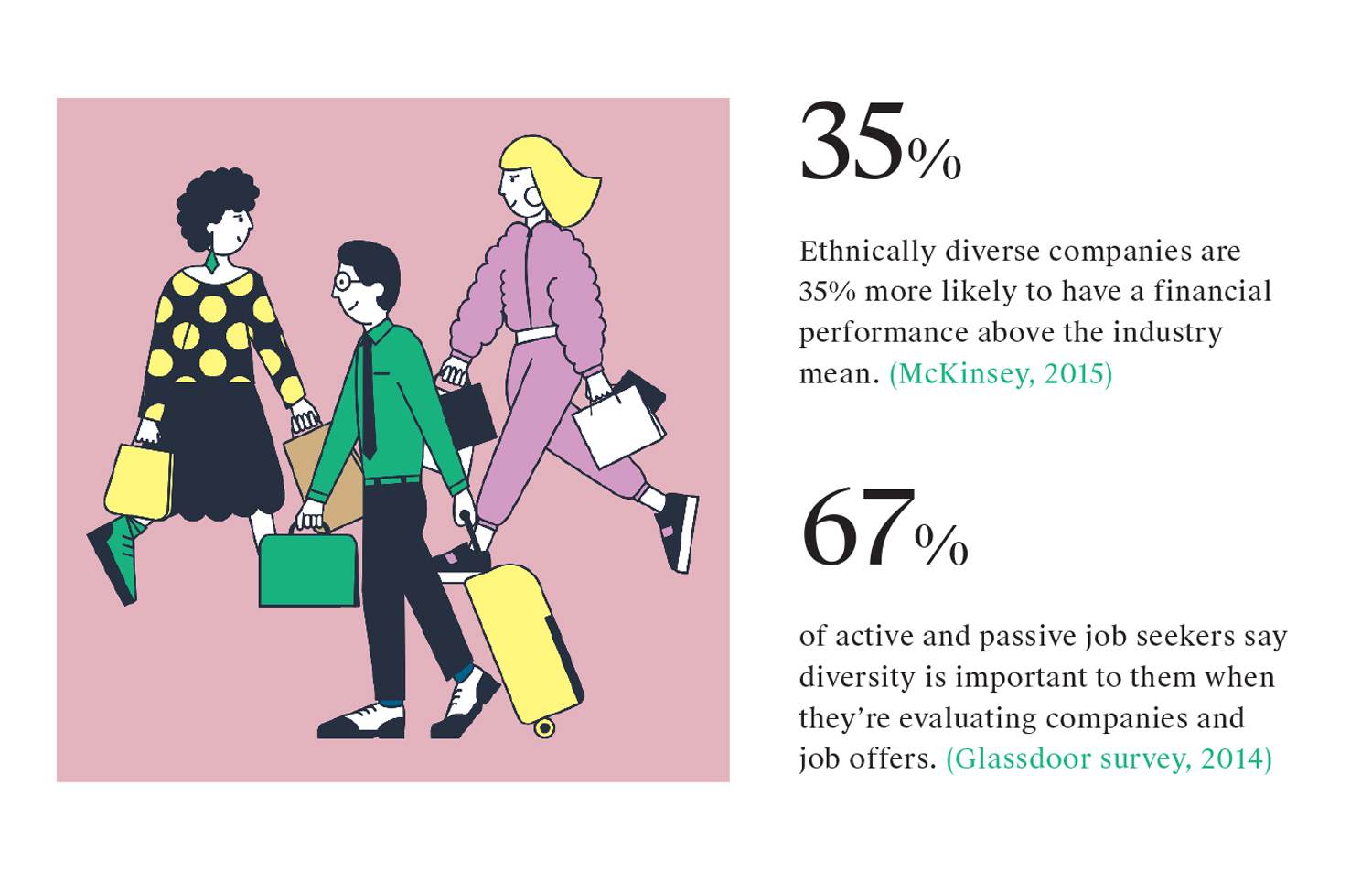What does it take to find the right people to grow your company with? What if that search is on in New Delhi, Paris and Copenhagen? We reached out to Budbee’s Simon Strindberg and Quuppa’s Kimmo Kalliola to discuss the ABC of global recruiting.
Recruiting is never easy, no matter where you’re doing it. What happens, when you throw a little bit of global flavour into the mix? A global recruitment campaign can mean long-distance phone calls and shooting in the dark, but a hire done according to both clear company culture and a well-thought-out strategy (not forgetting a healthy dose of intuitive thinking) can yield great results and even make it easier for a company to plant its roots around the globe. Yet, when it comes to finding the right people, is there a secret sauce? And if so, could anyone share the recipe? We called two very different growing companies to ask about their views on recruitment decisions that stretch from this side of the Atlantic to the other.
“I think the people we have recruited are the most crucial factor in our success,” starts Simon Strindberg, Chief Communications Officer of Budbee, a technology company that specialises in modern last-mile logistics for e-commerce businesses. Since delivering their first parcel, the company has grown into a contemporary business that both thinks and hires globally. Today, Budbee reaches around 26 million customers across Sweden, Finland, Denmark and the Netherlands — yet, as Strindberg says, “there are way more of us on this beautiful planet”. Compared to many other businesses, Budbee occupies a field that is more of a conundrum than others. Being a logistics company, it needs to have as strong a local presence, yet cultivate a very global practice.
“We are very present even on a micro-local way,” explains Strindberg, “which is why being global is very much ingrained in our DNA.” Hence, although Budbee started as a Stockholm-based venture, its core idea is global and its recruiting strategy looks very much like its growth strategy: ambitious, global and innovative. And, although they haven’t quite reached the level of global presence they are aiming for, the mentality is there.
“A lot of the things we do are completely new,” Strindberg explains, “so we’re trying to find people around the globe who are willing to innovate with us on our journey.” According to Strindberg, one of the best ways to ensure that the best people gravitate to your company is to keep your already existing employees happy. As he illustrates it, talent attracts talent; people attract people. If you can gather a group of interesting and inspiring people and keep them inspired, they’ll feel inclined to bring in their talented friends. “It’s still very much a people’s business,” concludes Strindberg.

Kimmo Kalliola, CEO and Co-founder of Quuppa, whose Intelligent Locating System (TM) provides an engine for various location-based services and applications, is on the same wavelength as Budbee’s Strindberg. Headquartered in Espoo, Finland, Quuppa has a global presence with offices in, among others, Dubai, Beijing and Sydney. Although being spread around the world requires video conferences and e-mails, Kalliola believes in the power of intuition and networks first and foremost.
“We’ve recruited in multiple different ways,” he says, “and the most important factor in successful hires is finding the right people to help you out.” Quuppa’s recruitment strategy has relied both on organic networks and organisations that connect businesses with the right talent abroad. “What’s vital is to find an organisation that has the same goals as you,” explains Kalliola. A common strategic interest and proven track records in connecting the right people with each other is, for Kalliola, one of the hallmarks of a successful collaboration.
“Look for an organisation that is interested in building long standing collaborative relationships.” For Quuppa, collaboration with organisations like Business Finland and Fin-Chi has proven to be fruitful. Yet, at the end of the day, the decisions are still made face-to-face. “Despite our relationships with different organisations, it’s always been important for us to actually meet our recruits face-to-face,” explains Kalliola. After all, the final push is about intuition.
“Intuition is not a measurable force and not always right, yet by following your gut, you’ll find the right people.
When it comes to intuition, it is a tricky and elusive force of nature. Yet for Kalliola, it is one of the most important tools of decision-making when it comes to hiring around the globe. “Intuition absolutely plays a big part in the entire process,” he says. To grow that intuitive sense, he recommends meeting people and having different conversations; finding out who you click with and who shares your ambitions. “Intuition is not a measurable force and not always right, yet by following your gut, you’ll find the right people.”
For Quuppa, many hires have come through reliable networks and the management team’s intuition has sometimes led them to do unconventional things. When the company was setting up an office in North America, their first office abroad, they had a lengthy ponder about the right way of approaching the task. They mulled over the crucial questions: how to find the right person to lead the venture and where to find that person. In the end, one of the founders of the company decided to relocate to the US to set up their first office. After six months, their large network yielded a result and they found the right person from the co-founder’s own contacts.
“To be honest, a small part of every hire comes down to luck,” Kalliola remarks. “As long as you’re active, keep your eyes and ears open and speak up, you’ll see the right people pop up eventually.” For Budbee, tackling new markets has sometimes taken root in finding the right local person. In the Netherlands, the company’s first recruitment was the local general manager, who flew to Stockholm to the headquarters to make sure that they grasped how the company treats its people, vendors and customers.

And, at the end of the day, a company is its people. Behind numbers, pie charts and statistics lies a company culture built by people, for people. Both Strindberg and Kalliola emphasise the importance of a strong company culture that both attracts and retains global talent. “For us, crossing the 100-employee line was a revelation,” explains Strindberg. “Since then, we’ve realised that we need to make sure that any new recruits really understand how we want to live at Budbee and they can grow our culture, too.”
Every new Budbee recruit is tested not only based on their resumés or portfolios, but also based on their personalities and willingness to learn — things that are at the very core of the company. “We don’t hire just based on skills; instead, we’re looking for people who are the right fit,” he illustrates. Budbee’s company culture is all about being hands-on, no matter where you’re based or what title you have printed on your business card. When Black Friday rolls around, everyone pitches in.
“Seeing that everyone keeps their promises and is a true part of this company really builds a culture that has staying power globally and locally,” says Strindberg. At Quuppa, global company culture is based on communications; not only online, but also face-to-face. Regular meetings and chats ensure that everyone is kept up-to-date. “We were actually a little worried about our company culture when we took Quuppa global,” confesses Kalliola. In the end, they had nothing to worry about. “It was actually far easier than we thought,” Kalliola exclaims when asked about how everything developed. Every international Quuppa hire is done in person and every new employee is flown to Finland to meet the company and get to know the Quuppa way of working.
Every two weeks, the company gathers online for a big company-wide meeting. Yet, what Kalliola sees as the most vital part of Quuppa’s global company culture is what he calls the “real FaceTime” — being together in the same place. “Being together builds bonds that can’t be built over Slack channels or inspirational posters,” he explains. Every Winter, the company gathers its people in one location, whether it’s Lapland or the Alps, and the staff spends quality time together.
“We try to use our time wisely. We work on our strategies and then hit the slopes or go for a hike on a glacier.” According to Kalliola, real time spent together will rise in value as our day-to-day lives become busier and even more global. “The key is to know your people and know them well.”
It seems like the future of going global will still be about what humanity is at its core: meeting face-to-face and building bonds that last.

Words: Matilda Kivelä Illustration: Niola Laurora
Published 02.07.2020
